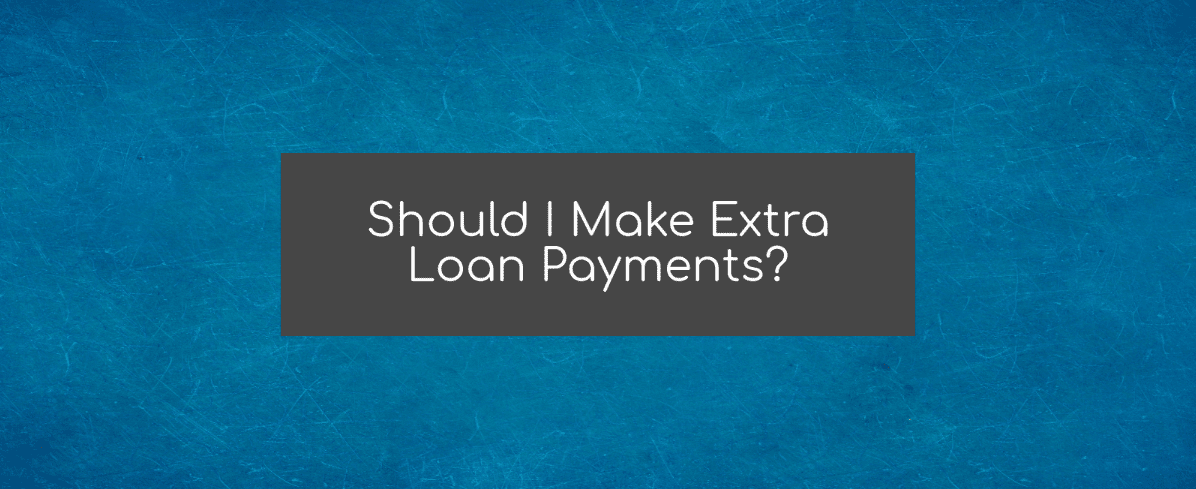Should I Make Extra Monthly Loan Payments?
If you've ever listened to Dave Ramsey, one of the first things that he tells his disciples is that they should make extra loan payments in order to pay down debt, before they ever think about investing or using money in other ways. That may be an overstating of Dave Ramsey's philosophy...for example, there may be things that Ramsey says to do first, such as contributing to a 401k in order to get the company's matching contribution, but there aren't very many examples like this. And yes, if you are like me, it seems the answer to this question, isn't so black and white.
In 2017, the Federal Reserve reported that there were 6.8 million student loan borrowers between the age of 40 and 49 and that only 60 percent of student loan borrowers expect to pay off their student loans in their 40s.
So the question is...should I make extra monthly loan payments? Let's assume this question isn't so cut and dry and that there is some gray area, where this question should be given careful consideration. Here are some possible reasons why there is gray area here.
- Do you have enough money to make extra monthly payments?
- Not all debt is created equal. Is your debt in student loans? A home mortgage? An automobile of some sort? Or even a business? This should impact your decision.
- What rate of return can you safely receive from an alternative investment relative to the interest rate on your loan?
- What is your risk tolerance? Do you have a large or small risk appetite?
- Is there a debt forgiveness clause if you meet certain qualifications at some point in the future?
These are 5 simple reasons why paying off debt with extra mortgage payments may not be the right thing to do, but they may also confirm that making additional payments IS the RIGHT thing to do. Let's look at these more closely.
Having Enough Money
This is a question that must be asked, albeit a simple question. In a situation where money is scarce, a person could actually be exposing themselves to serious risks by pouring every last penny into paying off debt. For example, what would happen to this person if they lost their job and they don't have 3 to 6 months of savings to fall back on while they look for their next job? They would be in trouble. Debt payments would continue to come due but their means of paying the debt payments would be gone. So it is important that a person balance one risk(debt) with other risks(losing a job). However, if it is possible to pay extra, it may be beneficial no matter what the extra amount.
Different Types of Debt
Not all types of debt are created equal. Sometimes, there is better debt and sometimes, there is worse debt. Even Dave Ramsey would agree that some types of debt are better than other types of debt. For example, student loans are debt with no physical asset backing up the debt. Whereas a home mortgage might be considered "better" debt as home mortgages have a physical asset backing up the loan...the home itself. Then there are automobile loans...they have a physical asset as collateral, but the physical asset is a depreciating asset that is losing value with time and use. Therefore, it is not a great form of debt to have either. To put it simply, if the debt is backed by something(an asset) that will hold its value, then this is preferable to debt on something with no tangible value such as a student loan or something that will lose its value.
Along the same lines, because different types of debt are better than other, mortgage rates will be higher with riskier types of debt. And don't forget about the tax deduction that one gets from the mortgage interest deduction. This again sets mortgage home loans apart from other forms of debt.
Investment Alternatives
Do you believe you can get a higher rate of return than the interest rate you're being charged on your loan? Do you believe you can do it with a relatively low amount of risk? Then it may be a better decision to invest the money in an effort to earn more interest than is being charged on the loan. This would be considered a form of arbitrage, however, miscalculating the risk of the alternative investment could result in loss of capital whereas paying off a loan provides a guaranteed rate of return equal to the interest rate being charged. Another term for this would be "opportunity cost" of using money in one place versus another.
What Is Your Risk Tolerance?
If you have a high tolerance for risk, then investing the extra money rather than paying off debt may be the better option in your mind. At the very least, a higher risk tolerance opens the window to a larger variety of investment alternatives versus paying off the debt. As was stated previously, paying off the debt is as low risk as possible as it guaranatees a rate of return equal to the interest rate of the loan.
Is There Debt Forgiveness?
Certain loans may have a clause in them where at some point in the future, if qualifications are met, then the loan can be forgiven. If a person is working towards meeting these qualifications at some point in the future, then it doesn't make sense to make extra payments toward your loan today, if the debt will be forgiven tomorrow. When speaking about debt forgiveness, the scenario where this is most common is related to student loans. For example, medical students that agree to work in hospitals in a rural part of America get their debt paid for them via a certain government program. In another example, certain military programs do this as well. It won't make sense to pay off a loan if the loan will be paid off for you at some point in the future.
According to a study from the America Economic Association Papers and Proceedings, more than 70 percent of Americans between the age of 56 and 61 were still in debt in 2010. In 1992, only 6 percent of Americans of the same age range held debt.
Conclusion
In conclusion, paying off a loan with extra payments is not always a cut and dry decision as conventional wisdom likes to suggest. This article has laid out 5 potential circumstances where making extra payments on a principal balance should be considered carefully before proceeding. However, if you are one of the many that believes making extra monthly payments is for you, then know that IQ Calculators has many different types of loan calculators where it is possible to enter an extra monthly loan principal payment in order to see how it affects your loan payoff rate and loan amortization schedule. If you are paying of loans to save money, our loan calculators will show just how much can be saved. We hope you found this article helpful in conquering your debt and improving your financial life.


